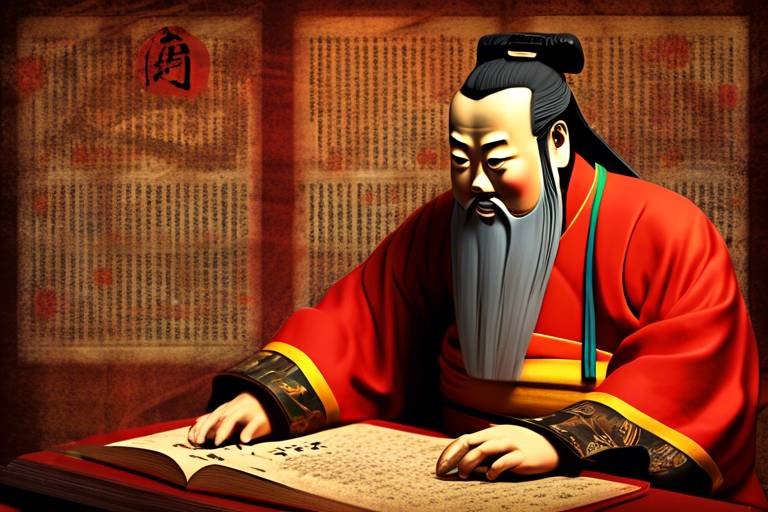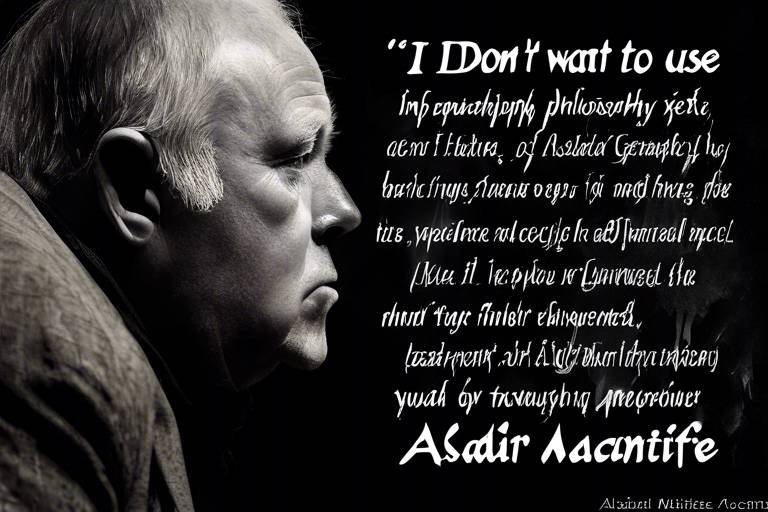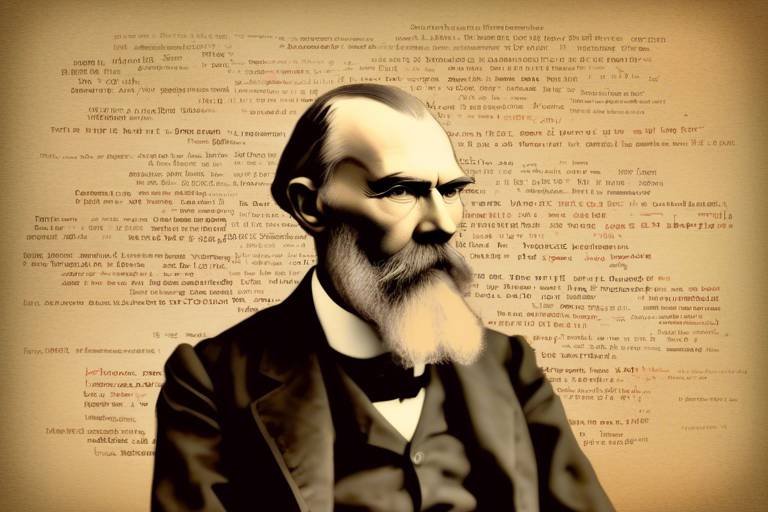Anaxagoras: How His Mind Metaphysics Influenced Plato
When we think about the roots of Western philosophy, one name often stands out: Anaxagoras. A philosopher from the ancient city of Clazomenae, Anaxagoras introduced groundbreaking ideas that not only challenged the status quo of his time but also laid the groundwork for future thinkers, including Plato. His profound insights into the nature of matter and the role of the mind have resonated through the ages, shaping metaphysical discussions and influencing countless scholars. In this article, we will explore Anaxagoras' philosophical contributions and how they intricately wove into the fabric of Plato's thought, creating a tapestry of ideas that continues to inspire today.
Anaxagoras was a pioneer who dared to think differently. He proposed that everything in the universe consists of infinitely divisible particles, a notion that was radical for his time. Unlike his predecessors, such as Thales, who believed that water was the fundamental substance of all things, or Heraclitus, who focused on change as the essence of existence, Anaxagoras introduced a more complex view of reality. He suggested that all things are composed of tiny, indivisible particles that he called seeds. This idea of a multitude of particles laid the groundwork for later scientific thought, emphasizing that matter could be infinitely broken down into smaller components.
At the heart of Anaxagoras' philosophy lies the concept of Nous, or Mind. This was not just a vague notion; Anaxagoras defined Nous as a cosmic force that organized the chaos of the universe. Imagine a chaotic room filled with scattered toys; it takes a thoughtful mind to arrange them neatly. Similarly, Anaxagoras believed that Nous brought order to the cosmos, creating harmony out of disorder. This idea of a guiding intelligence was revolutionary and would later influence Plato's own concept of a higher reality governed by rational thought.
When we compare Anaxagoras to other Pre-Socratic philosophers, his uniqueness becomes evident. While thinkers like Pythagoras focused on numbers and their relationships, and Heraclitus emphasized the constant flux of life, Anaxagoras stood apart with his focus on the interplay between mind and matter. He introduced a duality that was previously unexplored, paving the way for more profound metaphysical discussions. This duality of chaos and order is a theme that would echo through the works of later philosophers, particularly Plato, who admired Anaxagoras for his innovative approach.
Anaxagoras believed that the universe was initially in a state of chaos, and it was through the action of Nous that this chaos was transformed into order. This idea is significant as it suggests that the universe is not merely a random collection of particles but is instead organized and purposeful. Plato, who was deeply influenced by this notion, would later explore the idea of a perfect realm of Forms, where everything exists in its ideal state. The relationship between chaos and order in Anaxagoras' thought provided a philosophical framework that would resonate in Plato's dialogues.
The impact of Anaxagoras on Plato's thought is profound and multifaceted. Plato adopted several elements of Anaxagoras' philosophy, particularly the idea that a guiding intelligence shapes the universe. This is evident in Plato's Theory of Forms, where he posits that the physical world is a reflection of a higher reality governed by perfect Forms. Anaxagoras' emphasis on Nous as a cosmic ordering principle can be seen as an early precursor to Plato's belief in a rational structure underlying reality.
Delving deeper into the relationship between Anaxagoras and Plato, we can see how Anaxagoras' ideas may have influenced Plato's Theory of Forms. Anaxagoras suggested that the essence of things is inherent in the particles themselves, while Plato argued that true knowledge comes from understanding the ideal Forms that exist beyond our physical reality. Both philosophers grappled with the nature of existence, but their approaches were distinct. Anaxagoras focused on the material aspects of the universe, while Plato sought to transcend the material through rational thought.
The legacy of Anaxagoras extends far beyond his immediate contributions. His philosophical inquiries opened the door for future generations to explore the complexities of existence. Later philosophers, including Aristotle and the Stoics, acknowledged Anaxagoras' influence, even as they sought to refine and challenge his ideas. His thoughts on Nous, chaos, and order have remained relevant, prompting ongoing discussions in contemporary philosophy about the nature of reality and the mind's role in shaping it.
Several key philosophers have drawn inspiration from Anaxagoras' work, illustrating the reach of his metaphysical concepts. For instance, Aristotle critiqued and built upon Anaxagoras' ideas, particularly in his exploration of substance and form. The Stoics also incorporated aspects of Anaxagoras' thought into their understanding of the cosmos, emphasizing a rational order in the universe. This enduring influence showcases how Anaxagoras' innovative ideas have shaped the evolution of Western thought.
In contemporary philosophy, Anaxagoras' work continues to be a subject of interest and debate. Modern scholars have re-evaluated his contributions, recognizing their significance in the context of metaphysical discussions. His ideas about the nature of matter and the role of the mind have found resonance in various fields, including science and cognitive theory. As we strive to understand the complexities of existence, Anaxagoras' insights remind us of the rich tapestry of ideas that have shaped our philosophical landscape.
- Who was Anaxagoras? Anaxagoras was a Pre-Socratic philosopher known for his revolutionary ideas about matter and the mind, particularly the concept of Nous.
- How did Anaxagoras influence Plato? Anaxagoras' ideas about the mind and the organization of the cosmos significantly shaped Plato's metaphysical framework, particularly his Theory of Forms.
- What is the significance of Nous in Anaxagoras' philosophy? Nous is the cosmic mind that brings order to chaos, a concept that influenced later philosophical thought about the nature of reality.
- What legacy did Anaxagoras leave behind? Anaxagoras' contributions laid the groundwork for metaphysical discussions in Western philosophy, impacting thinkers like Aristotle and the Stoics.
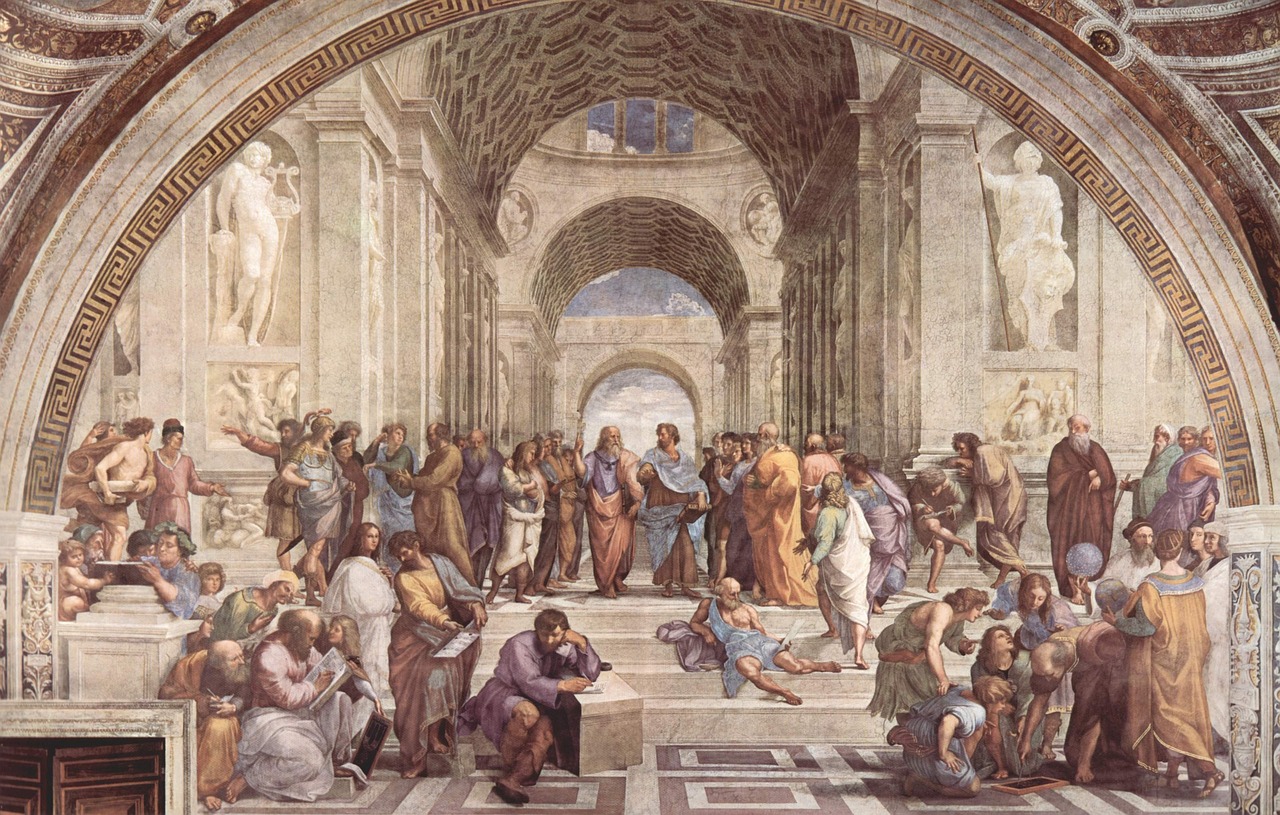
Understanding Anaxagoras' Philosophy
Anaxagoras, a pivotal figure in the landscape of ancient Greek philosophy, introduced a plethora of radical ideas that challenged the status quo of his time. Unlike his predecessors, such as Thales and Heraclitus, who focused primarily on the nature of substances and change, Anaxagoras took a bold leap into the realm of matter and mind. He proposed that everything in the universe is composed of infinitely divisible particles, which he termed “seeds” or “homeomeries.” This notion was revolutionary, as it suggested that there was no single fundamental substance that made up the universe; rather, everything was a mixture of these countless particles. Imagine a vast cosmic soup where everything we see and know is just a blend of tiny, unseen ingredients! This idea not only expanded the understanding of matter but also laid the groundwork for future metaphysical explorations.
One of the most striking aspects of Anaxagoras' philosophy is his belief in the interconnectedness of all things. He argued that everything contains a part of everything else, which leads us to ponder significant questions about identity and existence. For instance, a piece of wood contains a bit of metal, air, and even spirit, suggesting that the boundaries we perceive are merely illusions. This concept starkly contrasts with the views of earlier philosophers who sought to identify a singular essence of matter. Anaxagoras’ perspective invites us to think of the universe as a dynamic web of relationships rather than a collection of isolated entities.
Moreover, Anaxagoras' ideas on the nature of reality were not merely theoretical; they had profound implications for how we understand the cosmos. He introduced the notion that Nous, or Mind, is the organizing principle of the universe. This was a significant departure from the chaotic interpretations of existence prevalent in his time. Anaxagoras posited that Nous is a divine, intelligent force that brings order to chaos. This idea resonates with many, as it suggests that there is a purposeful structure to the universe, a theme that would deeply influence later thinkers, including Plato.
To illustrate the contrast between Anaxagoras and his predecessors, we can look at a simple comparison:
| Philosopher | Core Belief | Key Contribution |
|---|---|---|
| Thales | Water is the fundamental substance of all things. | Introduced the idea of a single underlying principle. |
| Heraclitus | Change is central to the universe; everything is in flux. | Emphasized the concept of perpetual change. |
| Anaxagoras | Everything is made of infinitely divisible particles; Nous organizes the cosmos. | Challenged the notion of singular substances; introduced the organizing principle of Mind. |
This table highlights how Anaxagoras carved out a unique niche in the philosophical discourse of his day, merging ideas of substance with the metaphysical implications of mind. His thoughts were not just abstract musings; they were a clarion call for a new understanding of reality, one that would influence generations to come. By blending the physical and metaphysical, Anaxagoras set the stage for discussions that would eventually culminate in the works of Plato and beyond.
In summary, Anaxagoras' philosophy is a rich tapestry woven from the threads of matter, mind, and the intricate relationships that bind them. His radical ideas not only contrasted sharply with those of earlier philosophers but also paved the way for deeper explorations into the nature of existence. His legacy is a testament to the power of questioning and redefining the boundaries of philosophical thought.

The Concept of Nous
Anaxagoras introduced a groundbreaking idea that would ripple through the corridors of philosophy: the concept of Nous, which translates to "Mind" or "Intellect." This wasn't just a casual term for him; it represented a fundamental force that organized the cosmos. Imagine a vast, chaotic universe—now picture an artist meticulously arranging a chaotic canvas into a stunning masterpiece. That artist, in Anaxagoras' framework, is Nous. This idea was revolutionary, suggesting that there was an intelligent principle behind the order of everything we observe.
Unlike earlier philosophers, who often attributed the nature of reality to a single substance—like Thales’ water or Heraclitus’ fire—Anaxagoras proposed that everything is composed of infinitely divisible particles. He believed that these particles were in a state of chaos until the intervention of Nous. In his view, Nous was not just a passive observer; it actively shaped and organized the world around us. It is fascinating to consider how this contrasts with the more elemental views of his predecessors, who lacked the concept of an organizing intelligence.
To grasp the significance of Nous, we can break down its key attributes:
- Intelligent Principle: Nous is the ultimate source of order and structure in the universe.
- Active Organizer: It moves and arranges the particles, transforming chaos into a coherent reality.
- Infinite and Divine: Nous is not limited by physical constraints; it is a divine intellect that transcends the material world.
This notion of Nous deeply influenced Plato, who later integrated similar ideas into his own philosophy. For Plato, the existence of an ideal realm of Forms echoes Anaxagoras' belief in an organizing principle that shapes our reality. The connection between their thoughts creates a fascinating dialogue about the nature of existence and intelligence.
Moreover, the implications of Nous extend beyond mere organization. It raises profound questions about the nature of reality itself: If an intelligent force is at play in the cosmos, what does that imply about free will, destiny, and the very essence of being? Anaxagoras dared to tread where many feared, suggesting that understanding the universe requires acknowledging a higher intelligence at work.
As we continue to explore the impact of Anaxagoras on subsequent thinkers, it becomes evident that his concept of Nous laid the groundwork for a more intricate understanding of metaphysics. This intellectual legacy is a testament to how one philosopher's radical ideas can shape the thoughts of others, creating a rich tapestry of philosophical inquiry.
- What is Nous in Anaxagoras' philosophy?
Nous is the principle of Mind or Intellect that organizes the cosmos and brings order to chaos. - How does Anaxagoras' concept of Nous differ from earlier philosophers?
Unlike earlier thinkers who focused on a single substance, Anaxagoras introduced the idea of an intelligent force that actively shapes reality. - What influence did Nous have on Plato?
Plato adopted the notion of an organizing principle in his Theory of Forms, reflecting Anaxagoras' impact on his metaphysical framework.

Anaxagoras vs. Pre-Socratic Philosophers
Anaxagoras stands out in the landscape of Pre-Socratic philosophy like a bright star in a clear night sky. While his contemporaries were busy unraveling the mysteries of the cosmos with their elemental theories, Anaxagoras took a bold leap into the realm of the mind and its relation to matter. Unlike Thales, who posited that water was the fundamental substance of everything, or Heraclitus, who emphasized the ever-changing nature of reality, Anaxagoras introduced the radical idea that everything is composed of infinitely divisible particles. This notion not only challenged existing paradigms but also paved the way for deeper metaphysical inquiries.
In contrast to the elemental focus of his predecessors, Anaxagoras proposed that all things are made up of a mixture of particles, a concept that he referred to as homeomeric substances. This idea suggests that even the smallest components of matter retain the properties of the larger whole, which was a revolutionary thought at the time. Imagine a cake: no matter how small a crumb you take, it still retains the essence of the entire cake. This analogy captures Anaxagoras’ belief that everything is interconnected through these particles, which he believed were influenced by a divine force he called Nous or Mind.
To better understand Anaxagoras' unique position among Pre-Socratic thinkers, let's compare some of his core ideas with those of his predecessors in the following table:
| Philosopher | Core Belief | Distinctive Contribution |
|---|---|---|
| Thales | Everything is made of water. | Introduced the concept of a single substance as the source of all things. |
| Heraclitus | Everything is in a state of flux. | Emphasized change as the fundamental essence of reality. |
| Anaxagoras | All things consist of infinitely divisible particles. | Introduced the idea of Nous as the organizing principle of the cosmos. |
Anaxagoras' emphasis on the mind as a cosmic ordering force set him apart from other thinkers who primarily focused on physical elements. He argued that it was Nous that instilled order into the chaotic universe, transforming chaos into a structured reality. This perspective not only influenced Plato but also initiated a shift in philosophical thought, steering it towards a more metaphysical understanding of existence. By introducing the concept of a governing mind, Anaxagoras laid the groundwork for subsequent philosophical explorations into the nature of reality and existence.
In summary, while Thales and Heraclitus examined the physical components of the universe, Anaxagoras expanded the discussion to include the metaphysical, inviting future philosophers to ponder not just what the universe is made of, but also how it is organized and understood. His innovative ideas challenged the conventional wisdom of his time and opened up a new pathway for philosophical inquiry, ultimately influencing thinkers like Plato and shaping the trajectory of Western philosophy.

The Role of Chaos and Order
Anaxagoras' philosophy presents a fascinating exploration of the relationship between chaos and order. He proposed that the universe begins in a state of chaos, a primordial soup where everything is mixed together, lacking any discernible structure. This chaotic state is not merely a void; it is filled with an infinite number of particles, each possessing potential. Imagine a jumbled box of puzzle pieces, where each piece represents a different aspect of reality, yet they remain scattered and disconnected. It is through the action of Nous, or Mind, that this chaos is transformed into order. Nous acts as the organizing principle, bringing coherence and structure to the disarray. This idea is revolutionary, suggesting that intelligence and thought are not just human traits but fundamental forces in the cosmos.
To understand Anaxagoras' view of chaos and order, we can break it down into several key aspects:
- Chaos as Potential: Anaxagoras viewed chaos as a state filled with potential. Just like a seed holds the potential for a tree, chaos contains the building blocks of all existence.
- The Role of Nous: The introduction of Nous is crucial. It is the catalyst that takes the raw potential of chaos and shapes it into the ordered universe we perceive.
- Dynamic Process: The transformation from chaos to order is not a one-time event but a continuous process. Anaxagoras believed that Nous is always at work, maintaining the order of the cosmos.
This duality of chaos and order not only reflects Anaxagoras' understanding of the universe but also serves as a precursor to later philosophical discussions, particularly those of Plato. Plato would later explore the implications of chaos and order in his own works, particularly in the context of the Theory of Forms. Anaxagoras’ insights provided a foundation for understanding how the material world can reflect a higher, more ordered reality. The interplay between chaos and order is not just a philosophical abstraction; it resonates with our everyday experiences. We often find ourselves navigating through chaos, whether it be in our personal lives, societal structures, or even the natural world. The quest for order amidst chaos is a universal theme, one that Anaxagoras captured beautifully in his metaphysical framework.
In essence, the role of chaos and order in Anaxagoras' thought highlights a dynamic process that is fundamental to understanding the universe. It invites us to consider the delicate balance between disorder and structure, urging us to recognize the potential that lies within the chaos of our own lives. As we reflect on these concepts, we can appreciate how Anaxagoras’ ideas have shaped not only the trajectory of Western philosophy but also our understanding of existence itself.
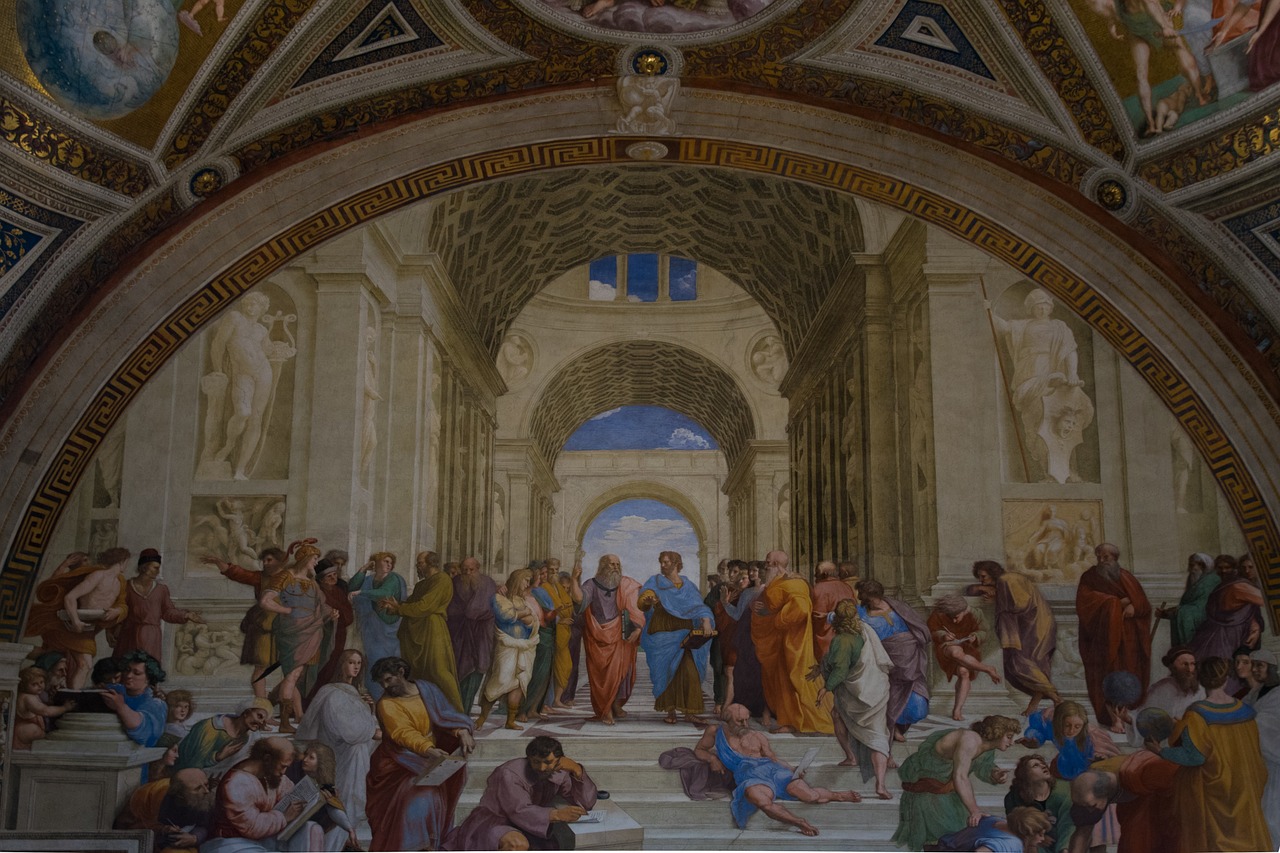
Impact on Plato's Thought
The influence of Anaxagoras on Plato's thought is nothing short of profound. Anaxagoras introduced groundbreaking ideas about the nature of reality and the role of the mind, which resonated deeply with Plato's own philosophical inquiries. One of the most significant aspects of Anaxagoras' philosophy that Plato adopted was the concept of Nous or Mind, which Anaxagoras posited as the organizing principle of the cosmos. This notion suggested that there was an intelligent force that structured the chaotic elements of the universe, a theme that Plato would later explore in his own metaphysical framework.
For Plato, the idea of a higher intelligence governing the universe aligned perfectly with his belief in the existence of ideal forms. He saw Anaxagoras' Nous as a precursor to his Theory of Forms, where the physical world is merely a shadow of a more perfect, unchanging reality. This connection is critical because it highlights how Anaxagoras set the stage for Plato's exploration of dualism—the distinction between the material and immaterial worlds. Plato's dialogues often reflect this dualism, as he seeks to understand the relationship between the tangible and the abstract.
Moreover, Anaxagoras' assertion that everything is composed of infinitely divisible particles posed a challenge to Plato's views on the nature of reality. While Anaxagoras emphasized the material composition of objects, Plato was more inclined to focus on the essence of things, which he believed existed in a realm of perfect forms. This divergence in perspective led Plato to refine his own ideas and articulate a more complex understanding of existence, one that acknowledged both the material and the immaterial.
In addition to these philosophical overlaps, Anaxagoras' thoughts on chaos and order significantly shaped Plato's understanding of the cosmos. Anaxagoras believed that chaos could be transformed into order through Nous, suggesting a dynamic interplay between these two states. Plato, in his works, frequently revisited this theme, exploring how knowledge and wisdom could bring order to the chaotic experiences of human life. This idea resonates with the allegory of the cave, where enlightenment leads individuals from the darkness of ignorance into the light of understanding.
Ultimately, Anaxagoras' influence on Plato is a testament to the interconnectedness of philosophical thought. By challenging and expanding upon the ideas of his predecessors, Anaxagoras not only shaped Plato's metaphysical inquiries but also laid the groundwork for future generations of thinkers. The dialogue between chaos and order, the role of mind, and the essence of reality are themes that continue to echo through the annals of philosophy, demonstrating the lasting impact of Anaxagoras on the intellectual landscape.
- What is Anaxagoras known for? Anaxagoras is known for introducing the concept of Nous, or Mind, as the organizing principle of the cosmos, and for proposing that everything consists of infinitely divisible particles.
- How did Anaxagoras influence Plato? Anaxagoras influenced Plato through his ideas about the mind's role in organizing the universe and the nature of reality, which helped shape Plato's Theory of Forms and his exploration of dualism.
- What is the significance of chaos and order in Anaxagoras' philosophy? Anaxagoras believed that chaos could be transformed into order through the action of Nous, highlighting a dynamic relationship that Plato later incorporated into his own philosophical inquiries.
- Are there any modern interpretations of Anaxagoras' work? Yes, modern philosophers and scholars continue to explore Anaxagoras' contributions, assessing their relevance in contemporary discussions of metaphysics and the nature of reality.

The Theory of Forms
The Theory of Forms is one of the most significant contributions of Plato to Western philosophy, and its roots can be traced back to the revolutionary ideas of Anaxagoras. At its core, this theory posits that the material world is not the ultimate reality; instead, it is merely a shadow of a higher, unchanging reality composed of abstract Forms or Ideas. Anaxagoras laid the groundwork for this notion by suggesting that everything in the universe is made up of infinitely divisible particles, which he called seeds. These seeds represent the essence of all things, much like Plato's Forms, which embody the true nature of objects beyond their physical manifestations.
To understand this connection, we must first explore how Anaxagoras viewed the world. He believed that while the physical world is in a constant state of flux, the true essence of reality lies in the stability of Nous, or Mind. This duality between the changing material world and the constant realm of Nous mirrors Plato's distinction between the world of appearances and the world of Forms. In essence, Anaxagoras' idea that a divine intelligence organizes the chaos of matter can be seen as a precursor to Plato's belief that the Forms provide order and meaning to the chaotic physical world.
For instance, consider the Form of Beauty. Plato argued that the physical manifestations of beauty—like a beautiful painting or a stunning landscape—are merely imperfect representations of the true Form of Beauty, which exists in the realm of Forms. Anaxagoras, with his concept of Nous, suggests that there is an organizing principle that brings together the chaotic elements of the material world into something recognizable and meaningful. Thus, it is not far-fetched to say that Anaxagoras' metaphysical framework influenced Plato's understanding of how Forms operate within the universe.
Moreover, the relationship between Anaxagoras' seeds and Plato's Forms can be illustrated through the following table:
| Anaxagoras' Seeds | Plato's Forms |
|---|---|
| Infinitely divisible particles representing the essence of things | Unchanging, perfect ideals that represent the true nature of objects |
| Organized by Nous to create order from chaos | Imperfect material objects participate in the Forms, seeking to embody them |
This comparison highlights how Anaxagoras' ideas served as a stepping stone for Plato's philosophical explorations. Plato took the notion of the unchanging reality that Anaxagoras hinted at and expanded it into a comprehensive metaphysical system that sought to explain not only the nature of reality but also the relationship between the physical and the abstract. This transition from Anaxagoras' seeds to Plato's Forms reflects a significant evolution in philosophical thought, bridging the gap between early metaphysical inquiries and more sophisticated frameworks.
In summary, Anaxagoras' contributions to metaphysics significantly influenced Plato's Theory of Forms. By establishing the idea that a higher intelligence organizes the chaotic material world, Anaxagoras provided a foundation upon which Plato could build his own theories. The interplay between these two philosophers illustrates the dynamic nature of philosophical evolution, where ideas are not created in isolation but are often the result of dialogue across generations. The legacy of Anaxagoras, therefore, is not just in his own right but also as a catalyst for one of the most enduring philosophical concepts in history.
- What is Anaxagoras known for?
Anaxagoras is known for introducing the concept of Nous (Mind) as a cosmic organizing principle and for proposing that everything is made of infinitely divisible particles. - How did Anaxagoras influence Plato?
Anaxagoras' ideas about the nature of reality and the role of Nous significantly influenced Plato's Theory of Forms, emphasizing the distinction between the material world and the world of ideals. - What is the Theory of Forms?
The Theory of Forms posits that the material world is a reflection of a higher reality made up of perfect, unchanging Forms or Ideas.

Legacy and Reception
Anaxagoras, often overshadowed by his more famous contemporaries, has left a profound legacy that resonates through the corridors of Western philosophy. His radical ideas about the nature of matter and the universe paved the way for later thinkers to explore concepts that would shape metaphysical discussions for centuries. While he may not have enjoyed the same level of fame as Plato or Aristotle, his influence is undeniable and can be traced through the works of many philosophers who followed him.
One of the most significant aspects of Anaxagoras' legacy is his introduction of the concept of Nous, or Mind, as a cosmic organizing principle. This idea was revolutionary during his time and challenged the prevailing notions of a chaotic universe. It set a precedent for later philosophers, including Plato, who would adopt and adapt this idea in their own frameworks. The duality of chaos and order that Anaxagoras proposed became a central theme in philosophical discourse, influencing not only metaphysics but also the development of scientific thought.
In the centuries following Anaxagoras, many philosophers acknowledged his contributions, albeit sometimes indirectly. For instance, the Stoics and Epicureans drew upon his ideas about the fundamental nature of reality, while the Neoplatonists integrated his notions of Nous into their metaphysical systems. Anaxagoras' legacy can be summarized in the following key points:
- Introduction of Nous: The idea of a cosmic Mind that organizes the universe.
- Influence on Plato: His thoughts helped shape Plato's metaphysical framework, particularly the Theory of Forms.
- Impact on Later Philosophers: His concepts were pivotal for Stoics, Epicureans, and Neoplatonists.
Despite the importance of his ideas, Anaxagoras faced significant challenges during his lifetime. His views were often met with skepticism and even hostility, particularly from those who adhered to traditional beliefs. He was accused of impiety for suggesting that the sun was a fiery rock rather than a divine entity, illustrating the tension between emerging scientific thought and established religious views. However, this resistance only highlights the courage of his convictions and the revolutionary nature of his philosophy.
In modern times, Anaxagoras is increasingly recognized for his contributions to the field of philosophy. Scholars have revisited his work, emphasizing its relevance to contemporary discussions about the nature of reality and consciousness. His ideas about the infinite divisibility of matter resonate with modern scientific concepts, making him a figure of interest not only in philosophical circles but also in scientific discourse.
Today, Anaxagoras is often included in discussions of the Pre-Socratic philosophers, and his thoughts are considered essential for understanding the evolution of metaphysical ideas. His legacy serves as a bridge between ancient philosophy and modern thought, illustrating the timeless nature of his inquiries into the cosmos and the mind.
- What is Anaxagoras best known for? Anaxagoras is best known for introducing the concept of Nous, or Mind, as a principle that organizes the cosmos.
- How did Anaxagoras influence Plato? Anaxagoras influenced Plato by providing a framework for understanding the relationship between the material world and the realm of forms, particularly through the concept of Nous.
- What challenges did Anaxagoras face during his lifetime? Anaxagoras faced accusations of impiety and skepticism regarding his radical views on the nature of the universe, particularly his assertion that the sun was a fiery rock.
- Why is Anaxagoras relevant today? Anaxagoras is relevant today because his ideas about the nature of reality and consciousness continue to resonate with both philosophical and scientific discussions.

Influence on Later Philosophers
Anaxagoras, often regarded as a pivotal figure in the development of metaphysical thought, left a profound impact on a multitude of later philosophers. His revolutionary ideas about the nature of reality and the role of Nous (Mind) not only challenged the existing paradigms of his time but also laid the groundwork for future philosophical explorations. Thinkers such as Socrates, Aristotle, and even the Stoics drew inspiration from Anaxagoras' concepts, which can be seen as a bridge connecting pre-Socratic philosophy to later, more structured philosophical systems.
One of the most significant ways Anaxagoras influenced his successors was through his notion of Nous as a cosmic ordering principle. This idea resonated deeply with Plato, who would later incorporate a similar concept into his Theory of Forms. The idea that a higher intelligence or form of consciousness organizes the chaotic elements of the universe was revolutionary. It prompted later philosophers to consider the implications of a rational mind governing the cosmos, leading them to explore the relationships between mind, matter, and existence itself.
Moreover, Anaxagoras' distinction between the infinite divisibility of matter and the role of Nous in bringing about order can be seen reflected in Aristotle's works. Aristotle, while critiquing Anaxagoras for not fully explaining the nature of change and the physical world, acknowledged the importance of his ideas. He recognized that Anaxagoras' emphasis on a unifying principle was crucial for understanding the complexities of existence.
In addition to Aristotle, the Stoics were significantly influenced by Anaxagorean thought. They adopted the idea of a rational order in the universe, viewing it as a manifestation of a divine reason or logos. This synthesis of Anaxagorean principles with Stoic philosophy illustrates the lasting relevance of his ideas, as they were adapted to fit the evolving landscape of philosophical inquiry.
To illustrate the breadth of Anaxagoras' influence, consider the following table that highlights key philosophers and their connections to Anaxagorean thought:
| Philosopher | Connection to Anaxagoras |
|---|---|
| Socrates | Inspired by the emphasis on rational thought and inquiry. |
| Plato | Integrated the concept of Nous into his Theory of Forms. |
| Aristotle | Critiqued but acknowledged the significance of Anaxagorean ideas. |
| Stoics | Adopted the notion of a rational order in the universe. |
In conclusion, Anaxagoras' philosophical contributions resonate through the ages, influencing not just his contemporaries but also shaping the thoughts of future generations. His ideas about the nature of reality, the role of Nous, and the relationship between chaos and order continue to be relevant, inviting ongoing exploration and interpretation in the realm of philosophy.
- What is Anaxagoras known for?
Anaxagoras is primarily known for introducing the concept of Nous (Mind) as a cosmic ordering principle and for his ideas regarding the infinite divisibility of matter.
- How did Anaxagoras influence Plato?
Anaxagoras influenced Plato by introducing the idea of a rational mind organizing the cosmos, which Plato incorporated into his Theory of Forms.
- Which philosophers were influenced by Anaxagoras?
Key philosophers influenced by Anaxagoras include Socrates, Plato, Aristotle, and the Stoics, each adapting his ideas to their philosophical frameworks.

Modern Interpretations of Anaxagoras
In the contemporary philosophical landscape, Anaxagoras is often revisited with a fresh perspective that highlights his innovative ideas about the nature of reality and the cosmos. Modern scholars have begun to appreciate the depth of his thought, particularly in relation to his concept of Nous, or Mind, which he posited as the organizing principle of the universe. This interpretation resonates with current discussions in metaphysics, where the relationship between mind and matter continues to be a central theme.
One of the most compelling aspects of Anaxagoras' philosophy is his assertion that everything is composed of infinitely divisible particles. This radical idea challenges traditional views of matter and has led modern philosophers to explore the implications of such a framework. For instance, contemporary physicists and metaphysicians are intrigued by how Anaxagoras' notion of matter aligns with modern theories in quantum physics, where particles behave in ways that defy classical understanding. The parallels between Anaxagoras' thoughts and current scientific theories raise intriguing questions about the nature of reality itself.
Furthermore, Anaxagoras' emphasis on chaos and order is particularly relevant today. His belief that chaos can be transformed into order through Nous invites modern thinkers to consider how complexity arises from simplicity in various fields, from cosmology to information theory. This idea is echoed in the works of contemporary philosophers who examine the dynamics of chaos theory and its implications for understanding the universe.
Many modern interpretations also delve into the ethical dimensions of Anaxagoras' thought. The idea that Nous has a guiding role in the cosmos suggests a form of intelligence or purpose behind existence, prompting discussions about the implications of such a view for ethics and human agency. Scholars are increasingly interested in how these ancient ideas can inform current debates about free will, determinism, and the nature of consciousness.
To encapsulate the essence of Anaxagoras' influence, let's consider a few key points that modern philosophers have highlighted:
- The Interconnectedness of All Things: Anaxagoras' belief that everything is made of the same basic particles resonates with modern ecological and holistic perspectives.
- The Role of the Observer: His ideas about the mind's role in shaping reality parallel contemporary discussions in quantum mechanics regarding the observer effect.
- The Emergence of Complexity: The transformation of chaos into order reflects modern theories of emergence in complex systems.
In conclusion, Anaxagoras' philosophical contributions continue to inspire and challenge modern thinkers. His ideas serve as a bridge connecting ancient philosophy with contemporary inquiries into the nature of existence, consciousness, and the universe. As we delve deeper into Anaxagoras' work, we uncover layers of meaning that remain relevant, prompting us to rethink our understanding of the cosmos and our place within it.
- Who was Anaxagoras? Anaxagoras was a pre-Socratic philosopher known for introducing the concept of Nous as the organizing principle of the cosmos.
- How did Anaxagoras influence Plato? Anaxagoras' ideas about mind and matter significantly influenced Plato's metaphysical framework, particularly his Theory of Forms.
- What is the significance of chaos and order in Anaxagoras' philosophy? Anaxagoras believed that chaos could be transformed into order through Nous, a concept that has implications for understanding complexity in the universe.
- How are Anaxagoras' ideas relevant today? Modern interpretations of Anaxagoras connect his thoughts to contemporary discussions in metaphysics, ethics, and science, highlighting their enduring significance.
Frequently Asked Questions
- What were Anaxagoras' main contributions to philosophy?
Anaxagoras introduced groundbreaking ideas about the nature of matter and mind, asserting that everything is composed of infinitely divisible particles. He emphasized the role of Nous, or Mind, as the organizing principle of the cosmos, which set the stage for later philosophical inquiries, particularly those of Plato.
- How did Anaxagoras define Nous?
Nous, in Anaxagoras' philosophy, is seen as a divine and intelligent force that brings order to chaos. He posited that Nous is responsible for the organization of the universe, allowing for the differentiation and arrangement of all matter. This concept significantly influenced Plato's own thoughts on the nature of reality and the cosmos.
- In what ways did Anaxagoras differ from other Pre-Socratic philosophers?
Unlike his predecessors, such as Thales and Heraclitus, who focused on elemental substances or the idea of constant change, Anaxagoras introduced a more complex understanding of reality. He proposed that everything is made of small particles and emphasized the importance of Nous in creating order from chaos, marking a shift towards metaphysical discussions that would later be expanded by Plato.
- What is the significance of chaos and order in Anaxagoras' thought?
Anaxagoras viewed chaos as a fundamental state of the universe, which is transformed into order through the action of Nous. This duality is crucial for understanding how he perceived the cosmos and influenced Plato's interpretations of order and structure in his own philosophical framework.
- How did Anaxagoras influence Plato's philosophy?
Anaxagoras' ideas had a profound impact on Plato, particularly in shaping his metaphysical framework. Elements such as the concept of Nous and the transformation of chaos into order can be seen in Plato's works, especially in his Theory of Forms, where he explores the nature of reality and existence.
- What is the Theory of Forms, and how is it related to Anaxagoras?
The Theory of Forms is a central concept in Plato's philosophy that posits the existence of abstract, non-material ideals or forms, which represent the true essence of things. Anaxagoras' focus on the organizing principle of Nous and the nature of reality likely influenced Plato's development of this theory, as both philosophers grappled with the relationship between the material and the immaterial.
- What is Anaxagoras' legacy in philosophy?
Anaxagoras' legacy extends beyond Plato, as he laid the groundwork for future philosophical thought. His ideas have influenced a range of philosophers throughout history, shaping discussions on metaphysics and the nature of reality, and continue to be relevant in contemporary philosophical discourse.
- How do modern philosophers interpret Anaxagoras' work?
Modern philosophers and scholars interpret Anaxagoras' work as a pivotal moment in the evolution of metaphysical thought. His concepts of Nous and the infinite divisibility of matter are seen as precursors to later philosophical developments, providing insights into our understanding of the universe and the nature of existence today.













